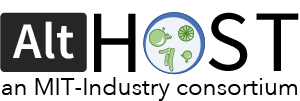June 22, 2020
New MIT-Led Consortium Seeks to Accelerate Biopharmaceutical Research, Development, and Manufacturing
Leading Biopharmaceutical Groups to work with MIT on Next Generation Alternative Host Cell Research
CAMBRIDGE, MA: The AltHost Consortium, a Massachusetts Institute of Technology-led collaboration, today announced a consortium of leading organizations in biopharmaceuticals and vaccines that will work to advance the speed and productivity of alternative host cell research and manufacturing. By adjoining MIT’s cutting-edge research and innovation with the resources and clinical understanding of the industry, “AltHost” will enable its members to work together in a common environment of knowledge, practices, and efficiencies.
By sharing alternative host cell research, AltHost members are supporting efforts to explore innovative ways to produce biologics and vaccines for clinical usage in diseases from diabetes to cancer. Biogen, Amgen, Pfizer Inc., Genentech – a member of the Roche Group, Sanofi, and the Bill & Melinda Gates Foundation are the first contributors into AltHost and its collective research, which comes at a critical time. Global health concerns like Alzheimer’s Disease and HIV are fueling a growing worldwide demand for biologic drugs. AltHost will aim to flexibly address industry needs, including improved product quality, and increased volumetric productivity. MIT has also committed to making this research available to meet growing global health needs.
The Consortium is led by J. Christopher Love, the Raymond A. (1921) and Helen E. St. Laurent Professor of Chemical Engineering and Member of the Koch Institute for Integrative Cancer Research at MIT. “When biomanufacturing first emerged as a field, shared knowledge across laboratories was crucial for the development of new technologies, and everyone had a stake in the conversation,” said Love. “In recent years, despite adopting similar approaches to manufacturing, some companies have behaved more independently. By returning the collaborative spirit we once had, we aim to enable new manufacturing solutions that offer both speed and volume.”
Biogen, the first company to engage with MIT in AltHost, hopes that by using an open-source model to create a common knowledge base they can more quickly and affordably serve patients. “Our initial evaluation has shown that leveraging an alternative host for biologics manufacturing has the potential to enable rapid development of high-quality mammalian-like proteins that could accelerate drugs into the clinic,” said Christina Alves, Principal Scientist at Biogen.
Currently, biopharmaceutical companies often rely on Chinese hamster ovary cells, or “CHO cells,” to produce new therapeutics. Development of capabilities in shared risk environments, like CHO consortia, has enabled broad adoption and engineering of this host, while balancing risks to individual member organizations. Similarly, AltHost seeks to build a library of customizable, alternative (non-mammalian) eukaryotic cells like yeast, fungi, and microalgae.
These hosts grow significantly faster than mammalian cells, do not harbor adventitious agents, and potentially allow for more agile applications with greater volumetric productivity. In fact, AltHost has already seen success with one yeast host, Pichia pastoris, which showed ten-fold improvement in volumetric productivity of monoclonal antibodies in the research to date. “By expanding the expertise in using new expression hosts through our joined consortium work, we hope to help transforming scientific knowledge and medical advances into next generation cutting-edge therapies,” says Daniel Degreif, Laboratory Head for Molecular Biology and Strain Development at Sanofi.
Increased speed to the clinic, perhaps enabled using new hosts, may be particularly critical in an era of precision medicines—more diverse products are needed with appropriate quality and customization, but with smaller volumes. AltHost is also working to engineer hosts to produce a diverse formulary, including specific product glycoforms or other variants.
As AltHost continues to make discoveries, it aims to convert its learnings into protocols and kits, including strains, vectors, and software tools, openly available to AltHost members for further individualized enhancement and application towards molecular pipelines worldwide.
About The AltHost Consortium:
Founded in 2018, AltHost Consortium is based within the Koch Institute for Integrative Cancer Research at the Massachusetts Institute of Technology. Created to fuel efficient, fast, and predictable manufacturing of high-quality recombinant protein drugs and vaccines, the Consortium intends to realize next-generation agile solutions for biologic manufacturing. The Consortium comprises Amgen, Biogen, Sanofi, Genentech, Pfizer Inc., and the Bill & Melinda Gates Foundation. Through the leadership of Professor J. Christopher Love at MIT, they work collaboratively to further experimentation, reduce research and development costs, flexibly address industry needs, including improved product quality, and increased volumetric productivity of high-quality drugs and vaccines. To learn more, please visit https://althost.mit.edu.
